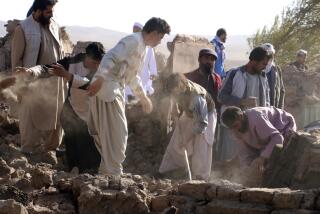Kabul Leaders Seek to Restore City : Afghanistan: But rocket attacks, looting go on as interim council backed by main guerrilla chief meets.
- Share via
KABUL, Afghanistan — As rockets continued to rain on the crippled Afghan capital, the nation’s new Islamic rulers struggled Thursday to restore electricity, water, telephones, air travel and, if possible, a semblance of normality to a city battered by four days of urban warfare and more than a decade of authoritarian regimes.
An interim council of moderate Muslims, backed by the charismatic guerrilla commander Ahmed Shah Masoud, convened for the first time since last Saturday’s mad race with fundamentalist followers of Gulbuddin Hekmatyar for control of Kabul.
“Every day, the situation is improving,” Masoud, who entered the capital late Wednesday with 100 tanks and 10,000 men, told reporters in brief comments outside the Mogul-era prime minister’s compound where the ruling council held its first session.
The commander conceded that some of the tribal militias that joined his coalition of moujahedeen groups against the fundamentalists have engaged in looting, and that he is concerned about it. But he added, “God willing, we will stop it.”
But Masoud closed the door on any compromise with the guerrillas of Hekmatyar’s Hezb-i-Islami party, who continue to lob dozens of rockets each day on the capital, including a devastating sunset barrage that kept Kabul’s international airport closed for the third straight day.
“Every group that is fighting the government,” he said, “is baghi “--a word that means subversive but translates broadly as “a moral enemy.”
When asked what will be done about Hekmatyar, Masoud said, “It is up to Professor Mojaddidi and the government.”
Afghanistan’s new president is Sibghatullah Mojaddidi, a religious scholar and revered Muslim figure who entered the capital Tuesday in a convoy escorted by moujahedeen, Muslim holy warriors, after a two-day journey from the rebels’ base in Pakistan. The change in government followed the ouster of the Soviet-installed strongman Najibullah and a subsequent period in which there was doubt as to who would win control of Kabul--the moderate guerrilla coalition under Masoud or the hard-line fundamentalist guerrillas under Hekmatyar.
Now, as sole leader of the 10-party moujahedeen resistance backing Mojaddidi’s new interim government, Masoud is the real power behind the government.
On Thursday, Mojaddidi presided over a session that included just 22 of the 51 interim ruling council members selected in Peshawar, Pakistan, in the final hours of Afghanistan’s authoritarian regime last week.
At the top of the agenda, according to Mojaddidi’s chief political aide, Hamid Karzai, were steps to restore Kabul’s phone, power and water lines that were damaged in three days of fighting between Masoud’s and Hekmatyar’s fighters.
Thousands of armed guerrillas who, for the moment, support Masoud’s coalition, careened through the capital in commandeered government cars and marched through the streets to enforce order against the backdrop of tribal anarchy. More shops were looted Thursday, gunshots resounded through the streets and a dozen more children died at the city’s hospitals, which, like most of the city, have no water, food or power for sterilization or surgery.
Much territory was captured during Masoud’s devastating urban offensive against positions that Hekmatyar’s rival forces had occupied in last Saturday’s dash to carve up the capital. On Thursday, the many groups that back the coalition continued their dangerous drive for more ground.
In a neighborhood just west of downtown Kabul, a crowd gathered around a Soviet-built artillery piece. Several members of the Harakat-i-Islami party, a Shiite Muslim faction that secured large and strategic sections of the capital, had found the weapon and claimed it. But they had no idea of how to repair it.
A soldier of the old regime arrived on the scene, was instantly drafted into the new Islamic army and prepared to fire it at a nearby hillside.
When asked about the fate of the village that lay immediately below their practice target, the soldier replied: “It’s security fire. The people don’t mind. After 13 years of war, what’s another round over their heads?”
The sense of impending anarchy was reinforced in the city’s famed Chicken Street, which deals largely in imported goods. More shops were smashed by tribal groups loyal to Masoud’s coalition, and there was a report of an English teacher, who lived in a nearby neighborhood, being led out of his house with hands tied and a sign around his neck reading, “Looter.”
There were other signs of reprisals. Despite President Mojaddidi’s declaration of general amnesty, reporters found several captured Hekmatyar supporters in leg chains in various parts of the city.
In some cases, officers were seen shooting at their own militiamen who were found looting Hekmatyar positions that Masoud’s forces had recaptured.
With the city transformed into a patchwork of rival armed groups, Masoud was asked what his forces plan to do about disarming the men who control the city, block by block and house by house.
“We will discuss it,” he said, as he headed toward the ruling council meeting.
More to Read
Sign up for Essential California
The most important California stories and recommendations in your inbox every morning.
You may occasionally receive promotional content from the Los Angeles Times.










